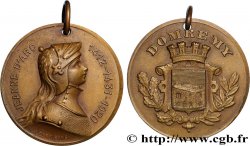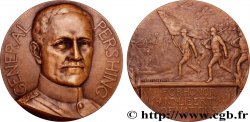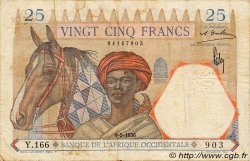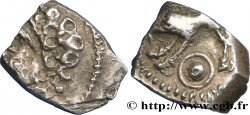E-auction 482-393213 - fme_757452 - III REPUBLIC Médaille, demi-millénaire de l’Université de Poitiers
You must signin and be an approved bidder to bid, LOGIN TO BID. Accounts are subject to approval and the approval process takes place within 48 hours. Do not wait until the day a sale closes to register. Clicking on « bid » constitutes acceptance of the terms of use of cgb.fr private e-auctions.
Bids must be placed in whole Euro amounts only. The sale will start closing at the time stated on the item description; any bids received at the site after the closing time will not be executed. Transmission times may vary and bids could be rejected if you wait until the last second. For further information ckeck the E-auctions F.A.Q.
NO BUYER'S FEE.
NO BUYER'S FEE.
| Estimate : | 60 € |
| Price : | 17 € |
| Maximum bid : | 19 € |
| End of the sale : | 11 July 2022 18:20:00 |
| bidders : | 6 bidders |
Type : Médaille, demi-millénaire de l’Université de Poitiers
Date: 1932
Metal : bronze
Diameter : 59 mm
Orientation dies : 12 h.
Engraver RIVAUD André (1892-1951)
Weight : 82,92 g.
Edge : lisse
Puncheon : sans poinçon
Coments on the condition:
Patine hétérogène, traces d’un ancien nettoyage. Présence de de coups, rayures à l’avers, au revers et sur la tranche. taches brunes à l’avers et au revers. Restes d’une ancienne étiquette sur l’avers
Obverse
Obverse legend : MINERVA PICTAVIENSIS.
Obverse description : Représentation de Minerve de profil et casquée. Signée : A. RIVAUD.
Reverse
Reverse legend : UNIVERSITE DE POITIERS / DEMI-MILLENAIRE / DE SA FONDATION / 1431 - 1432 / 1932.
Reverse description : Blason de l’Université de Poitiers composé d’un livre flanqué de deux lions et de trois fleurs de lys. Légende en cinq lignes.
Commentary
L’Université de Poitiers fut voulue par Charles VII pour récompenser le Poitou de sa fidélité à la couronne. Sa création fut actée par la bulle du Pape Eugène IV en 1431 (cf. Wikipédia).








 Report a mistake
Report a mistake Print the page
Print the page Share my selection
Share my selection Ask a question
Ask a question Consign / sell
Consign / sell
 Full data
Full data











